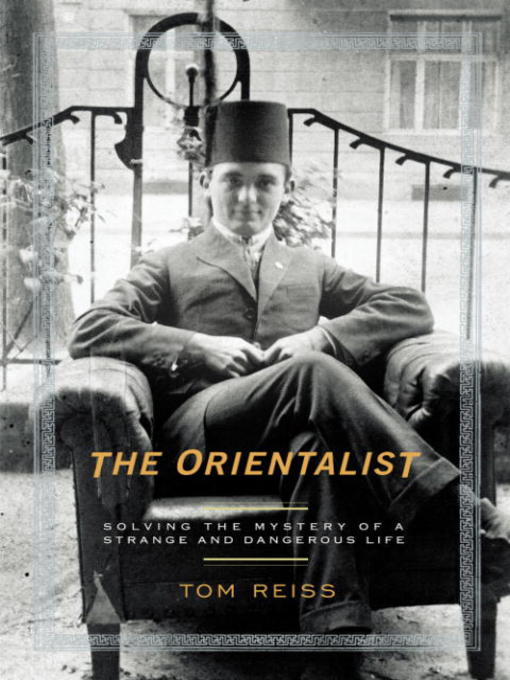Born in 1905 to a wealthy family in the oil-boom city of Baku, at the edge of the czarist empire, Lev escaped the Russian Revolution in a camel caravan. He found refuge in Germany, where, writing under the names Essad Bey and Kurban Said, his remarkable books about Islam, desert adventures, and global revolution, became celebrated across fascist Europe. His enduring masterpiece, Ali and Nino–a story of love across ethnic and religious boundaries, published on the eve of the Holocaust–is still in print today.
But Lev’s life grew wilder than his wildest stories. He married an international heiress who had no idea of his true identity–until she divorced him in a tabloid scandal. His closest friend in New York, George Sylvester Viereck–also a friend of both Freud’s and Einstein’s–was arrested as the leading Nazi agent in the United States. Lev was invited to be Mussolini’s official biographer–until the Fascists discovered his “true” identity. Under house arrest in the Amalfi cliff town of Positano, Lev wrote his last book–discovered in a half a dozen notebooks never before read by anyone–helped by a mysterious half-German salon hostess, an Algerian weapons-smuggler, and the poet Ezra Pound.
Tom Reiss spent five years tracking down secret police records, love letters, diaries, and the deathbed notebooks. Beginning with a yearlong investigation for The New Yorker, he pursued Lev’s story across ten countries and found himself caught up in encounters as dramatic and surreal, and sometimes as heartbreaking, as his subject’s life. Reiss’s quest for the truth buffets him from one weird character to the next: from the last heir of the Ottoman throne to a rock opera-composing baroness in an Austrian castle, to an aging starlet in a Hollywood bungalow full of cats and turtles.
As he tracks down the pieces of Lev Nussimbaum’s deliberately obscured life, Reiss discovers a series of shadowy worlds–of European pan-Islamists, nihilist assassins, anti-Nazi book smugglers, Baku oil barons, Jewish Orientalists–that have also been forgotten. The result is a thoroughly unexpected picture of the twentieth century–of the origins of our ideas about race and religious self-definition, and of the roots of modern fanaticism and terrorism. Written with grace and infused with wonder, The Orientalist is an astonishing book.
-
Creators
-
Publisher
-
Release date
February 15, 2005 -
Formats
-
Kindle Book
-
OverDrive Read
- ISBN: 9781588364449
-
EPUB ebook
- ISBN: 9781588364449
- File size: 1013 KB
-
-
Languages
- English
-
Reviews
-
Booklist
December 15, 2004
Lev Nussimbaum fabricated a life that in its brief arc encompassed the whole of the Western and Near Eastern culture of his time. A Jew from the Caucasus, born in the first throes of the Russian Revolution, he styled himself a Muslim prince. As Kurban Said, he wrote a best-selling novel that made him the toast of Nazi Germany. Inventing and reinventing himself, he left a confused and perplexing trail. Reiss pursues two great narratives, one recounting Nussimbaum's life itself, the other following the author's quest to ferret from among myths and outright lies the truth of this man's life. Along the way, readers absorb much about oil-rich Azerbaijan, the Russian Revolution, the rise of fascism, and the centuries-old clashes of cultures and religions in the Caucasus and Middle East. Digressions abound because of Nussimbaum's intricate, multicultural encounters. In the hands of a less adept writer, such complex history might grow opaque and tedious, but Reiss' storytelling flair and the utterly compelling character of Lev Nussimbaum turn this biography into a page-turner of epic proportion.(Reprinted with permission of Booklist, copyright 2004, American Library Association.) -
Library Journal
January 15, 2005
The Orientalist of this detailed biography is Lev Nussimbaum, a Jew who became a Muslim prince. Reiss ("Fuhrer-Ex") was able to flesh out Nussimbaum's mysterious life after discovering a cache of unpublished letters he wrote to a friend. He was born in Baku, Azerbaijan, in 1905 to a Jewish oil baron father and a Bolshevist mother who committed suicide when Nussimbaum was still a child. The Soviet takeover of Baku's oilfields sent him and his father fleeing into the Persian deserts, and thus began his lifelong infatuation with the Middle East and eventual conversion to Islam. He was a nomadic soul whose only constant was his gift as a writer. By the late 1920s, he had become a best-selling author in Weimar Germany under the pseudonyms Essad Bey and Kurban Said (his works of fiction and nonfiction are still considered minor classics), but he was forced to flee when Hitler gained power and died in Italy in 1938. Unfortunately, Reiss gets bogged down in tangential details while trying to place Nussimbaum in early 20th-century context, but this is still an important work that sheds light on the pre-Zionist phenomenon of Jewish Orientalism that led many Jews to embrace Muslim culture. Recommended for academic and public libraries with strong 20th-century literature or history collections. [See Prepub Alert, "LJ" 10/1/04.] -Jim Doyle, Sara Hightower Regional Lib., Rome, GACopyright 2005 Library Journal, LLC Used with permission.
-
Formats
- Kindle Book
- OverDrive Read
- EPUB ebook
Languages
- English
Loading
Why is availability limited?
×Availability can change throughout the month based on the library's budget. You can still place a hold on the title, and your hold will be automatically filled as soon as the title is available again.
The Kindle Book format for this title is not supported on:
×Read-along ebook
×The OverDrive Read format of this ebook has professional narration that plays while you read in your browser. Learn more here.


